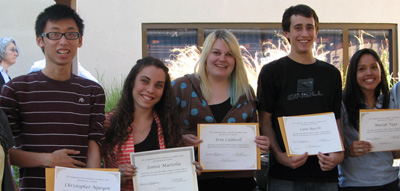UC Santa Cruz has received a $1.45 million grant from the National Science Foundation (NSF) Robert Noyce Scholarship Program to recruit and prepare new math and science teachers in partnership with regional school districts and community colleges. Noyce Scholarships support students who are committed to teaching science or mathematics in high-need school districts upon the completion of a teacher credential program.
The NSF grant provides continued funding for Noyce Scholarships at UCSC and supports partnerships between UCSC, seven community colleges, and four high-need school districts to enhance recruitment and retention of new teachers in key areas of district shortages, said Gretchen Andreasen, director of UCSC's California Teach Program (Cal Teach) and principal investigator on the grant.
Cal Teach is a successful undergraduate support program for prospective math and science teachers, providing internships, coursework, and scholarships. Between the Noyce Scholarships and the Mark Bruce Fellowships funded by UCSC alumnus Stephen Bruce, Cal Teach has been able provide substantial scholarships for most of the program's graduates who have gone on to earn a teaching credential and M.A. in education at UCSC, Andreasen said.
The new NSF grant will also support transfer students from community colleges who are interested in teaching math and science, providing up to 10 transfer students with 3 years of scholarship support to complete their undergraduate degree plus a graduate credential program. An additional 32 students will receive one year of scholarship support for the credential program.
UCSC's community college partners in this project are Cabrillo College, Cañada College, Foothill College, Gavilan College, Hartnell College, Ohlone College, and San José City College. The school district partners are East Side Union High School District, Gonzales Unified School District, Pajaro Valley Unified School District, and Santa Cruz City Schools.
"We have had success so far putting good math and science teachers in schools around the region, and the new Noyce Scholarship funds will help us collaborate effectively with the community colleges," Andreasen said. "Community colleges are often in high-need communities, and the prospective teachers we recruit tend to go back to those communities to teach."
For example, by recruiting students from Hartnell College in Salinas to enter the Cal Teach program, UCSC can support prospective math and science teachers who are likely to return to the area and teach at Gonzales High School, where there is a need for well-prepared math and science teachers, she said.
The new program's recruitment efforts will also extend to Silicon Valley professionals who may be interested in a career-change to teach math or science. They will be able to enroll in UCSC's new Silicon Valley-based teaching credential program starting in the 2014-15 academic year.
Most of the new NSF grant will go toward scholarships. The Noyce funds will also support intensive K-12 teaching experiences for UCSC and community college students in all four partner school districts. So far, about 500 UCSC students have done at least one Cal Teach internship, and of those who have graduated, about 30 percent have gone on to earn a teaching credential, Andreasen said. Cal Teach also has teacher induction programs to support new teachers in the partner districts. More than two dozen former Cal Teach students are now teaching at schools in Watsonville, Santa Cruz, the Salinas Valley, and the San Jose region.
The new NSF grant includes some funding for research on the outcomes of the scholarship program. In addition, separate grants from NSF are funding in-depth research programs on science and math education led by education professors Lora Bartlett and Trish Stoddart.



